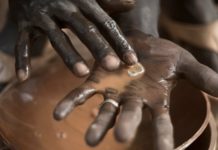
[miningmx.com] – THE gap between what the ANC wants from the economy and what is realistically possible has widened judging by the tone of the ruling party’s discussion documents ahead of its National General Council next month.
“A lot of the policy prescriptions in the discussion documents are impractical and just not feasible,’ said Claude Baissac, and his associate JP van der Merwe, both of the advisory firm Eunomix.
The National General Council (NGC) is the ANC’s mid-term review where the party takes stock of the implementation of policies and decisions made at its National Conference in Mangaung in 2012.
At its previous NGC in Durban in 2010, nationalisation of South Africa’s mines was still a contentious issue, but the notion – driven by the ANC Youth League under its former leader Julius Malema – is now dead.
“Not that wholesale nationalisation was ever really on the cards,’ said Baissac. “The ANC has successfully controlled the nationalisation debate and turned it into an introduction of the kind of radical pre-RDP policies.
“The discussion is now very much about resource nationalisation, state centrism and mixed economy which is quite frankly a huge concern.’
Van der Merwe added: “The nationalisation of mines would have cost the government a lot of money. Instead the ANC has very cleverly privatised the investments, benefits and profits and the party is continuing the broad concept of state-led intervention in mining.’
RENT TAX
The view of implementing a resource rent tax was repeatedly mentioned at the ANC’s Mangaung conference and it has since re-emerged in the current NGC discussion documents, despite the fact that the Davis Tax Committee advised against “new tax instruments’ for the mining industry in one of its reports.
Roger Baxter, CEO of the Chamber of Mines, said it seemed that the NGC discussion documents had been drafted before the tax committee’s report was published.
“The committee pointed out that the existing royalty system, with which we are very comfortable, already serves the purpose of a resource tax, making an additional tax mechanism obsolete.’
Baissac and Van der Merwe, however believe there could have been merit in a resource rent tax, but that it is now a missed opportunity with weak commodity prices.
“Our view has always been that a lot more could be done to improve mineral resource management in South Africa and there was such an opportunity during the commodity cycle boom, but the boat has sailed, as the tax burden would be much more limited during times of limit profits.’
BENEFICIATION
As in previous discussion documents the ANC has once again emphasised the necessity of mineral beneficiation.
The initiative however hasn’t taken off fully, because it’s uneconomic, said Van der Merwe and Baissac.
“The ANC believes it can manufacture the economy through taxes and regulation and red tape. If it were going to be successful we would have known, because these policies have been in place since about 2009. But it’s not – just look at the performance of the mining and steel industries.’
Gavin Keeton, economics professor at Rhodes University said government’s efforts to beneficiate are misguided.
“They assume minerals play an important part in the cost of production when in fact they don’t. One study showed that even if iron ore for example were free, our steel exports would still be uncompetitive in global markets. Productivity, labour costs, distance from markets and infrastructure costs are much more significant.
“Unless we deal with these other more significant costs mineral beneficiation won’t get off the ground.’
STATE MINING COMPANY
From the discussion documents, it’s clear the ANC is still resolute on establishing another state mining company. But analysts are sceptical.
“The state capacity in South Africa is simply not there,’ said Baissac. “What are the examples of successful state-owned companies in South Africa? Another SAA [South African Airways]?’
Where is the money going to come from?, said James Lorimer, DA MP and the party’s shadow minister of mineral resources. “Government has already spent its reserves on public sector wage increases. We’re at a point where there’s no money left.’
Keeton said it was not a question of capacity, but rather that state mining companies globally have been failures due to the cyclical nature or commodity prices.
“Mines need constant investment and state-owned mining companies often end up as under-capitalised high-cost producers. Would the South African government really like to own platinum mines at the moment?’









